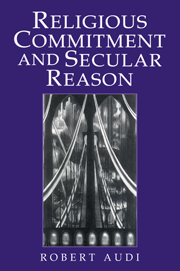Book contents
- Frontmatter
- Contents
- Preface
- PART ONE THE FOUNDATIONS OF DEMOCRACY AND THE SEPARATION OF CHURCH AND STATE
- PART TWO THE ETHICS OF CITIZENSHIP AND THE BALANCE OF RELIGIOUS AND POLITICAL ARGUMENTS
- PART THREE CIVIC VIRTUE AND POLITICAL ACTIVISM IN A RELIGIOUSLY PLURALISTIC DEMOCRACY
- 6 Civic Virtue
- 7 Religious Conviction and Political Activism
- Conclusion: Ethics, Religion, and Democracy
- Notes
- Index
6 - Civic Virtue
Published online by Cambridge University Press: 05 June 2012
- Frontmatter
- Contents
- Preface
- PART ONE THE FOUNDATIONS OF DEMOCRACY AND THE SEPARATION OF CHURCH AND STATE
- PART TWO THE ETHICS OF CITIZENSHIP AND THE BALANCE OF RELIGIOUS AND POLITICAL ARGUMENTS
- PART THREE CIVIC VIRTUE AND POLITICAL ACTIVISM IN A RELIGIOUSLY PLURALISTIC DEMOCRACY
- 6 Civic Virtue
- 7 Religious Conviction and Political Activism
- Conclusion: Ethics, Religion, and Democracy
- Notes
- Index
Summary
A democratic society cannot flourish if its citizens merely pursue their own narrow interests. If it is to do more than survive, at least a substantial proportion of citizens must fulfill responsibilities that go beyond simply avoiding the violation of others' rights and occasionally casting a vote. The vitality of a democracy requires that many citizens – ideally all of them – contribute something to their communities and participate responsibly in the political process. The disposition to do these things is a large part of what constitutes civic virtue. But that virtue encompasses more. My task here is to explore civic virtue. I first outline a broad conception of virtue and, with that set out, pursue the question of what makes a virtue civic. My special concern is to articulate what constitutes civic virtue in relation to the central problem of this book: how to determine a proper relation between religion and politics and, in the lives of religious citizens, an appropriate balance between religious and secular demands. I have already argued for a partial ethics of citizenship that can help in resolving this problem. Here I want to show how such an ethics can be plausibly reached from a conception of civic virtue.
This virtue-theoretic route to the principles I have proposed is entirely compatible with the arguments so far given; but even if one had certain doubts about those arguments, one could reach much the same standards by working from a conception of civic virtue that apparently has independent moral force.
- Type
- Chapter
- Information
- Religious Commitment and Secular Reason , pp. 145 - 180Publisher: Cambridge University PressPrint publication year: 2000

